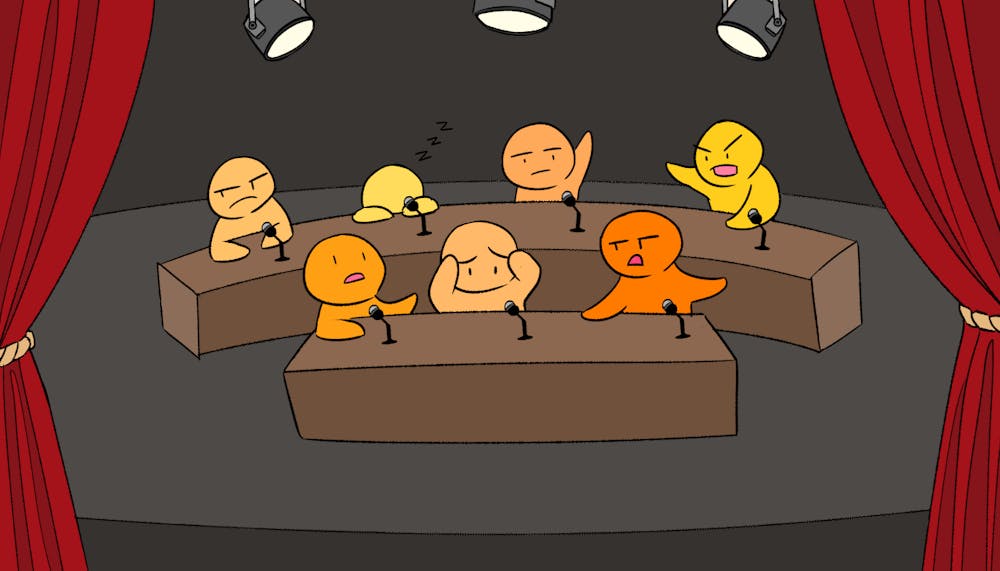When exploring the benefits and limitations of representative democracy through art, what better way could there be to do so than by having the audience of said art engage in that kind of democracy themselves? Students used this unique format during “Democracy Theater — City Council Meeting,“ a play born out of the fall freshman seminar FRS 143: “Is Politics a Performance?”
Staged as part of Wintersession on Monday, Jan. 25, the play was a reenactment of a city council meeting in Trenton, N.J., in which the audience itself participated as actors. It was meant to invite reflection on the character of representative democracy and the power imbalance it creates between those who are represented and those who represent them.
The play opened with a recorded video of an apolitical person expressing their dissatisfaction with electoral politics. The narrator tried, through his use of persuasive rhetoric, to convince him that democratic institutions are worth participating in. The video then cut to black as the creative team called on members of the audience to participate as actors in the play. Some of the actors became councilors, while others became members of the public, and all volunteers were given scripts. The rest of the play was about the interaction between these two groups of people.
The councilors deliberated and debated among themselves, whereas the citizenry tried to participate in whatever way they could. In what may be called the first half of the play, the councilors praised the local police chief for his effective police reform. The play therefore seemed, at first, to be a celebration of representative democracy. However, when the council closed the relevant matter and began to consider other items on the agenda, some councilors called an executive session. The motion narrowly passed, and the rest of the session was closed to the public, to the dismay of the citizens. The citizens discussed this antidemocratic move, and some sided with the councilors, claiming that only councilors were “qualified” to participate in democratic processes. Soon, everyone was muted. The play ended by discussing with the audience what it means to be qualified.
The play was a work of dichotomies. The distinction between the represented and the representatives ran like a fault line through the piece. The play itself seemed to vacillate between two ends of a pendulum, simultaneously extolling current democratic structures and questioning them.
The work replicated the structure of representative democracy both implicitly and explicitly. “Democracy Theater” was a condensed reenactment of a Trenton city council meeting. In this sense, it was an overt depiction of representative democracy. However, there was also an underlying layer of hierarchy, through which the very staging of the play became the artwork.
In this superterranean level, the play oscillated between encouraging people to participate in local democratic processes and questioning local democracy. At the start of the play, the actors encouraged the audience to participate in local democracy with patriotic language. In fact, the entire first half of the play mostly consisted of councilors praising the local police chief for undertaking effective reforms following the Black Lives Matter movement in a scene intended to praise local democratic processes.
In the second half, the pendulum swung in the other direction. This section of the play was dominated by issues of expertise and the distinction between councilors and ordinary citizens. Whereas the citizens and, by extension, the audience, could watch the play in the first half, a councilor called for an “executive session” in the second half, preventing the public and thus the audience from hearing their deliberations. While the councilors were gone, there was lively discussion among the citizens as to whether councilors should be permitted to call an “executive session” at all, with many passionately complaining about their exclusion. The issue of competence was first raised when a citizen named Ed Duffy, portrayed by Kristiana Filipov ’24, objected forcefully and alleged that nobody but the councilors were truly qualified to make policy. Shortly afterward, all the citizens were muted and were not allowed to speak.
Filipov is a contributing Prospect writer for the ‘Prince.’
At the subterranean level, the play itself demonstrated representative democracy in action. The act of choosing actors from the audience made the play participatory and seemed to act as a symbolic parallel to the participation of the general public in local democracy. Yet, much like real-life representative democracy, the selection of actors created a power hierarchy between those who were on center stage and those forced to watch from the sidelines. The actors were also divided into councilors and representatives, thus replicating a power hierarchy within a hierarchy and creating a three-tier power relationship.
However, quite paradoxically, this distinction collapsed in on itself the moment it was formed, as the audience thereby became “actors” whose role was that of passive bystanders in this self-reflective play.
In a way, this was emblematic of the inquisitive nature of the play, which told us much about representative democracy, but did not commit itself either to a critique or praise of it. True to its contemplative nature, the play ended with an open-ended discussion about representative democracy and what it meant to be “qualified.”

“Democracy Theater — City Council Meeting” was an ambiguous, pensive work on representative democracy that asked questions rather than provided answers. This fundamentally reflective play invited all participants to ruminate on the nature of democracy and, perhaps, to try and improve it.








